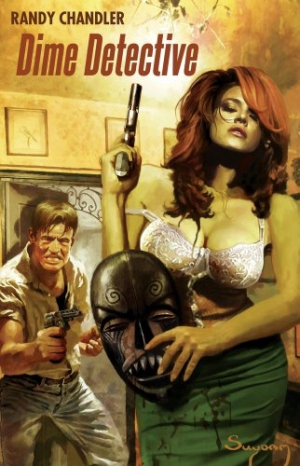Dime Detective
Over the past decade, ’50s and ‘60s pulp fiction novels written for men, known as “men’s adventure stories” or, less graciously, the “armpit slicks,” have enjoyed a resurgence in popularity. Massive collections like The Big Book of Adventure Stories and The Black Lizard Big Book of Pulps, both edited by Otto Penzler, helped bring this literary golden era back to readers’ attention. But unless one is a complete misogynist or has spent the last sixty years isolated in a fallout shelter, the genre’s blatant sexism and racism detract from the stories.
With the publication of his latest novel, Randy Chandler gives modern readers a truly wonderful taste of a bygone age complemented by today’s views on women and minorities.
The author of several novels, including Daemon of the Dark Wood and Hellz Bellz, Chandler’s writing has appeared in many anthologies, including Deadcore: 4 Hardcore Zombie Novellas and Alien Aberrations. Dime Detective comes four months after the re-release of his horror novel, Bad Juju, as an eBook.
Dime Detective tells the story of Joe Dall as he tries to discover who brutally murdered his ex-wife. A Korean War vet and two-bit bouncer pulling shifts in a dead-end joint in the late ‘50s, Dall finds himself heading the cop’s short list of suspects. But his former father-in-law, the richest man in Dodd City, offers irrefutable proof of Dall’s innocence. Using all his wealth and influence, the old man gets Dall a private investigator’s license and a permit to “carry,” and charges him with the task of finding out who killed Lizabeth Tibbedeaux.
As the body count rises, Dall finds support in the strong women around him. From Dot Barker, a kind of big sister, to Valentine Cooper and her shotgun, Chandler’s characters go beyond the stereotypical dames, dolls, and broads that filled the pulps for a cast of strong, multidimensional, and entertaining characters. Readers can only hope to see them again in a sequel.
A key aspect of any pulp story is punchy writing. Easy to satirize and easier to do badly, it’s a testament to Chandler’s skills that he’s able to capture the sound and still wink at it with lines like: “He was on the verge of reaching out, grabbing her and shaking it out of her. ‘Spit it out, sister. And turn off the crocodile tears.’ Wiping a tear from the corner of her eye with a fingertip, she suddenly laughed, wet eyes sparkling, and said, ‘that’s awful dialogue, Joe. You want to stay away from those clichés. Rewrite!’”
It is awful dialogue, awfully wonderful. And sister, there’s nothing in the world like it.
Reviewed by
Joseph Thompson
Disclosure: This article is not an endorsement, but a review. The publisher of this book provided free copies of the book and paid a small fee to have their book reviewed by a professional reviewer. Foreword Reviews and Clarion Reviews make no guarantee that the publisher will receive a positive review. Foreword Magazine, Inc. is disclosing this in accordance with the Federal Trade Commission’s 16 CFR, Part 255.

